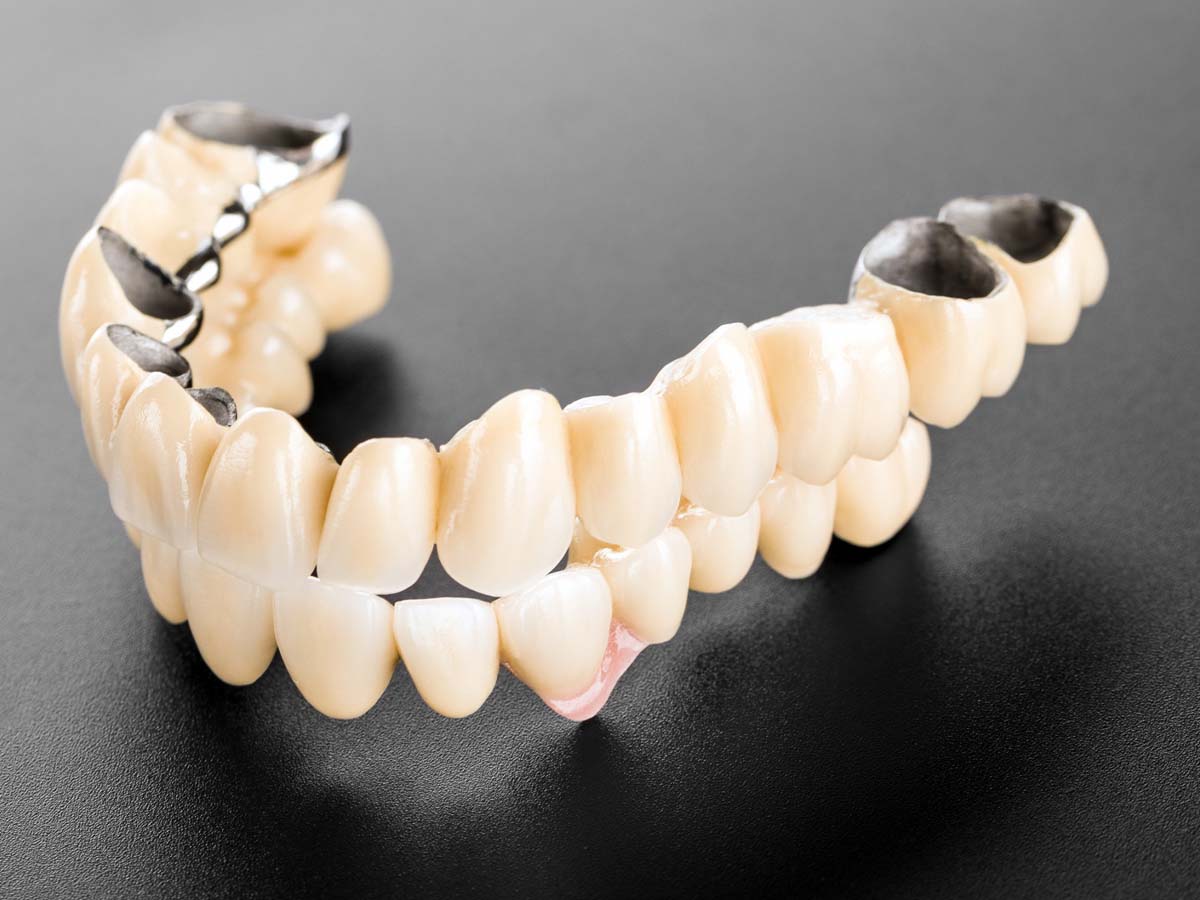Porcelain Bridges
Missing teeth can significantly impact your smile and your ability to eat and speak comfortably. Thankfully, porcelain bridges offer a reliable and aesthetically pleasing solution. This innovative dental restoration can seamlessly replace missing teeth, restore oral functionality, and enhance confidence. By choosing our experienced dentist in Palm Harbor, FL, you can ensure personalized care and exceptional results tailored to your needs.

What Are Porcelain Bridges?
Porcelain bridges are fixed dental restorations used to replace one or more missing teeth. These bridges consist of natural-looking porcelain prosthetic teeth (pontics) supported by adjacent teeth or dental implants. Known for their durability and lifelike appearance, porcelain bridges restore functionality and harmoniously blend in with your natural teeth.
Porcelain is preferred in restorative dentistry due to its strength and ability to mimic the translucency and texture of natural enamel. This ensures that your restoration is both functional and aesthetically pleasing.
The Benefits of Porcelain Bridges
Opting for porcelain bridges offers numerous advantages that can improve your oral health and overall quality of life:
Enhanced Aesthetics
Porcelain bridges are custom-designed to match the color, shape, and size of your natural teeth, ensuring a seamless appearance.
Improved Oral Functionality
Replacing missing teeth with a bridge allows you to chew and speak comfortably without discomfort or gaps.
Durability and Longevity
With proper care, porcelain bridges can last for many years, making them a cost-effective and durable solution.
Prevention of Dental Shifting
When a tooth is lost, the neighboring teeth may shift into the space, leading to alignment issues. Porcelain bridges fill the gap, preventing such complications.
Support for Jaw Health
Missing teeth can lead to bone loss over time. While bridges don't directly prevent bone loss, pairing them with dental implants can help maintain jawbone integrity.
Types of Porcelain Bridges
There are several types of porcelain bridges to suit varying dental needs:
Traditional Bridges
These bridges rely on crowns placed on adjacent teeth to support the prosthetic tooth. They are ideal when the surrounding teeth are healthy and strong.
Cantilever Bridges
Cantilever bridges are less common and typically recommended for less stressful areas in the mouth. They are used when only one adjacent tooth is available to support the bridge.
Implant-Supported Bridges
These bridges are anchored to dental implants rather than natural teeth. They provide exceptional stability and are an excellent option when multiple teeth are missing.
Maryland Bonded Bridges
This type uses a metal or porcelain framework bonded to the back of adjacent teeth instead of crowns for support. While less invasive, it may not be as durable as other options.
The Porcelain Bridge Procedure
Getting a porcelain bridge typically involves the following steps:
- Consultation and Evaluation: Our dentist will assess your oral health and discuss the best options for your needs. X-rays or impressions may be taken to evaluate the structure of your teeth and jaw.
- Preparation: If a traditional bridge is chosen, the supporting teeth (abutments) will be reshaped to accommodate crowns. For implant-supported bridges, dental implants will be surgically placed in the jawbone.
- Impressions and Design: Impressions of your teeth will be taken to create a custom bridge that fits seamlessly with your smile. The bridge will be designed to match the color and shape of your natural teeth.
- Temporary Bridge: A temporary bridge may be placed to protect your teeth and gums while the permanent bridge is being crafted.
- Final Placement: Once your custom porcelain bridge is ready, it will be fitted, adjusted, and permanently bonded or anchored to the abutments or implants.
Caring for Porcelain Bridges
Proper care and maintenance are essential to ensure the longevity of your porcelain bridge:
- Practice Good Oral Hygiene: Brush twice daily and floss around the bridge to prevent plaque buildup.
- Use a Floss Threader: A floss threader can help clean under the bridge effectively.
- Avoid Hard or Sticky Foods: Minimize the risk of damaging the bridge by avoiding foods that could cause cracks or dislodgement.
- Schedule Regular Check-Ups: Routine visits to our dentist in Palm Harbor, FL, ensure that your bridge remains in excellent condition and that potential issues are addressed early.
Why Choose Us for Porcelain Bridges in Palm Harbor, FL?
By choosing our practice for porcelain bridges in Palm Harbor, FL, you can rest assured that you are working with skilled professionals who understand your unique dental needs. Our qualified dentist's expertise ensures that your restoration is designed for optimal comfort, durability, and aesthetics.
Moreover, modern advancements in restorative dentistry have made the process of getting porcelain bridges more precise and efficient, reducing treatment times and enhancing results. Contact us to learn more.
Conclusion
Porcelain bridges are a transformative solution for individuals dealing with missing teeth. They restore your smile's appearance and functionality, boosting your confidence and improving your quality of life. When you choose our trusted dentist, you can expect expert care and a restoration tailored to your unique needs. Don't let missing teeth hold you back — explore the benefits of porcelain bridges in Palm Harbor, FL, and take the first step toward a healthier, more radiant smile today!
Schedule an appointment with us at Eastlake Center for Implants & Restorative Dentistry, located at 3488 Eastlake Rd, Suite 401, Palm Harbor, FL 34685, by calling (727) 785-7461. Visit our official website to learn more about the various services we provide.
Intra-Oral Scanner
Periodontics
All-on-X®
Sedation Dentistry
Implant Dentistry
Cosmetic Dentistry
Porcelain Crowns
General Dentistry
Oral Surgery
Teeth Whitening
Composite Fillings
Restorative Dentistry
Dental Technology
Porcelain Veneers
Full or Partial Dentures
Gum Contouring
Onlays
All-on-4®
Dental Implants
IV Sedation
Laughing Gas
Oral Sedation
Platelet Rich Plasma
Soft Tissue Laser
Digital X-ray
3D Imaging
Intra-Oral Camera
Location
3488 Eastlake Rd, Suite 401,
Palm Harbor, FL 34685
Office Hours
MON - FRI9:30 am - 5:30 pm
SATBy appointments only
SUNClosed
